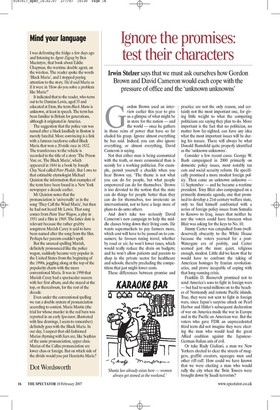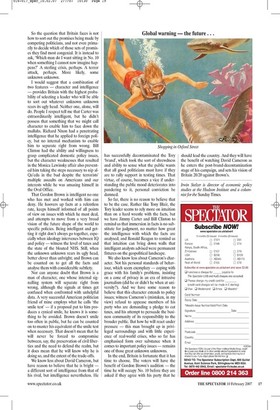Ignore the promises: test their characters
Irwin Stelzer says that we must ask ourselves how Gordon Brown and David Cameron would each cope with the pressure of office and the 'unknown unknowns' Cordon Brown used an interview earlier this year to give us a glimpse of what might be in store for the nation — and the world — once he gathers in those reins of power that have so far eluded his grasp. Ignore almost everything he has said. Indeed, you can also ignore everything, or almost everything, David Cameron is saying.
Not that either man is being economical with the truth, or more economical than is seemly for a working politician. For example, permit yourself a chuckle when you hear Brown say, 'The theme is not what you can do for people, but what people empowered can do for themselves.' Brown is too devoted to the notion that the state can do things for people better than they can do for themselves, too inveterate an interventionist, not to have a large store of plans to do unto others.
And don't take too seriously David Cameron's new campaign to help the middle classes bring down their living costs. He wants supermarkets to pay farmers more, which cost will have to be passed on to consumers; he favours taxing travel, whether by road or air; he won't lower taxes, which would really reduce the drain on budgets; and he won't allow patients and parents to shop in the private sector for healthcare and schools, thereby precluding the competition that just might lower costs.
These differences between promise and practice are not the only reason, and certainly not the most important one, for giving little weight to what the competing politicians are saying they plan to do. More important is the fact that no politician, no matter how far-sighted, can have any idea what the most important issues will be during his tenure. There will always be what Donald Rumsfeld quite properly identified as the 'unknown unknowns'.
Consider a few recent cases. George W Bush campaigned in 2000 primarily on domestic policy issues, most notably tax cuts and social security reform. He specifically promised a more modest foreign policy. Then came an unknown unknown — 11 September — and he became a wartime president. Tony Blair also campaigned on a primarily domestic agenda, one that promised to develop a 21st-century welfare state, only to find himself confronted with a series of foreign policy issues from Somalia to Kosovo to Iraq, issues that neither he nor the voters could have foreseen when Blair was asking for the keys to No. 10.
Jimmy Carter was catapulted from (welldeserved) obscurity to the White House because the voters yearned for a postWatergate era of probity, and Carter seemed just the man: quiet, religious enough, modest. Little did we know that he would have to confront the taking of American hostages by Iranian revolutionaries, and prove incapable of coping with that long-running crisis.
Franklin D. Roosevelt promised not to send America's sons to fight in foreign wars — but had to send millions on to the beaches of Normandy and remote Pacific islands. True, they were not sent to fight in foreign wars, since Japan's surprise attack on Pearl Harbor and Hitler's subsequent declaration of war on America made the war in Europe and in the Pacific an American war. But the voters who gave FDR an unprecedented third term did not imagine they were electing the man who would lead the great Allied coalition against the JapaneseGerman-Italian axis of evil.
Or take Rudy Giuliani, a man we New Yorkers elected to clear the streets of muggers, graffiti creators, squeegee men and other riff-raff. How could we have known that we were electing a man who would rally the city when the Twin Towers were brought down by Saudi terrorists?
So the question that Britain faces is not how to sort out the promises being made by competing politicians, and not even primarily to decide which of those sets of promises they find most congenial. It is instead to ask, 'Which man do I want sitting in No. 10 when something I cannot now imagine happens?' A sterling crisis, perhaps. A terror attack, perhaps. More likely, some unknown unknown.
I would suggest that a combination of two features — character and intelligence — provides Britain with the highest probability of selecting a leader who will be able to sort out whatever unknown unknown rears its ugly head. Neither one, alone, will do. People I respect tell me that Carter was extraordinarily intelligent, but he didn't possess that something that we might call character to enable him to face down the mullahs. Richard Nixon had a penetrating intelligence that he applied to foreign policy, but no internal mechanism to enable him to separate right from wrong. Bill Clinton had the ability and willingness to grasp complicated domestic policy issues, but the character weaknesses that resulted in the Monica Lewinsky affair also prevented him taking the steps necessary to nip alQa'eda in the bud despite the terrorists' multiple assaults on Americans and our interests while he was amusing himself in the Oval Office.
That Gordon Brown is intelligent no one who has met and worked with him can deny. He hoovers up facts at a relentless rate, keeps himself informed of all points of view on issues with which he must deal, and attempts to move from a very broad vision of the future shape of the world to specific policies. Being intelligent and getting it right don't always go together, especially when ideology intervenes between IQ and policy — witness the level of taxes and the state of the bloated NHS. Still, when the unknown unknown rears its ugly head, better clever than unbright; and Brown can be counted on to get all the facts and analyse them with considerable subtlety.
Nor can anyone doubt that Brown is a man of character, one whose internal signalling system will separate right from wrong, although the signals at times get confused when confronted with unhelpful data. A very successful American politician friend of mine employs what he calls 'the smile test' — if a proposal put to him produces a cynical smile, he knows it is something to be avoided. Brown doesn't smile too often in public, but he can be counted on to muster his equivalent of the smile test when necessary. That doesn't mean that he will never be forced to compromise between, say, the preservation of civil liberties and the need to defend the realm, but it does mean that he will know why he is doing so, and the extent of the trade-offs.
We know less about David Cameron, but have reason to believe that he is bright — a different sort of intelligence from that of his rival, but intelligence nevertheless. He has successfully decontaminated the Tory 'brand', which took the sort of shrewdness and ability to sense what the public wants that all good politicians must have if they are to rally support in testing times. That virtue, of course, becomes a vice if understanding the public mood deteriorates into pandering to it, personal conviction be damned.
So far, there is no reason to believe that to be the case. Rather like Tony Blair, the Tory leader seems to rely more on intuition than on a hard wrestle with the facts, but we have Jimmy Carter and Bill Clinton to remind us that immersion in facts is no substitute for judgment, no matter how great the intelligence with which the facts are analysed; and Ronald Reagan to remind us that intuition can bring down walls that intelligent analysts advised were permanent fixtures on the geopolitical landscape.
We also know less about Cameron's character. Not his personal standards of behaviour, which seem exemplary — coping with grace with his family's problems, insisting on a cone of privacy in an era of intrusive journalism (did he or didn't he when at university?). And we have some reason to believe that this character extends to policy issues; witness Cameron's (mistaken, in my view) refusal to appease members of his party who are demanding a pledge to cut taxes, and his attempt to persuade the business community of its responsibility to the broader public. But how he will react under pressure — this man brought up in privileged surroundings and with little experience of real-world crises, who so far has emphasised form over substance when it comes to important policy issues — remains one of those great unknown unknowns.
In the end, Britain is fortunate that it has time to choose. The voters will have the benefit of Gordon Brown's audition — the time he will occupy No. 10 before they are asked if they agree with his party that he should lead the country. And they will have the benefit of watching David Cameron as he enters the post-brand-decontamination stage of his campaign, and sets his vision of Britain 20/20 against Brown's.
Irwin Stelzer is director of economic policy studies at the Hudson Institute and a columnist for the Sunday Times.














































 Previous page
Previous page